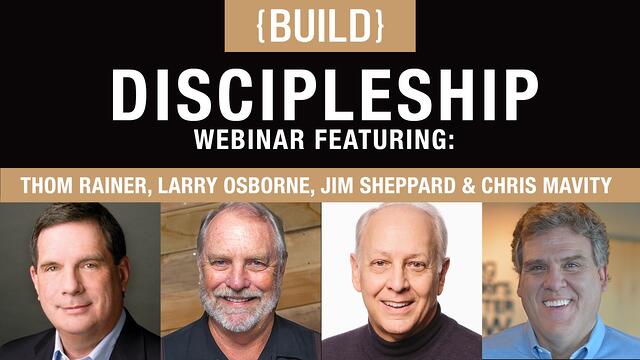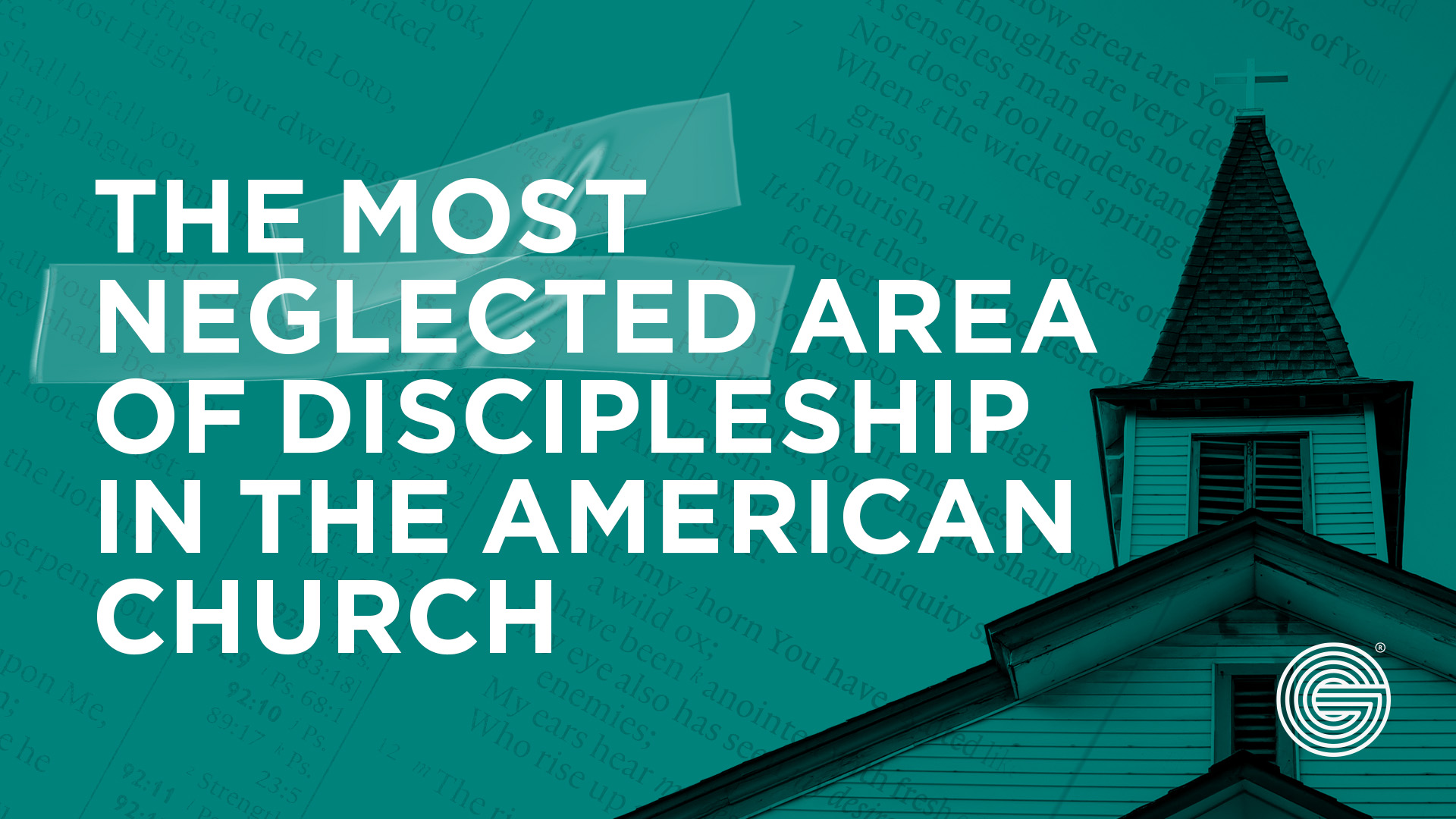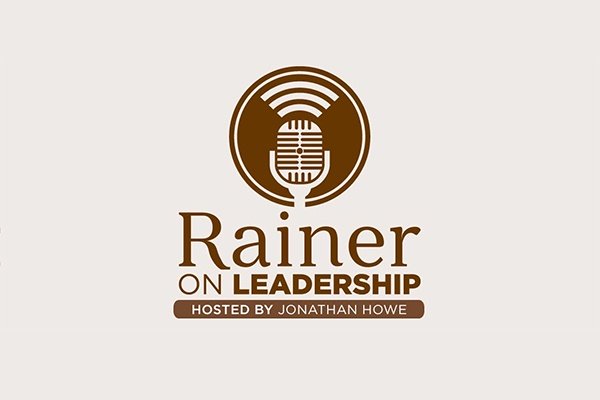Discipleship Webinar by Chris Mavity with Thom Rainer, Jim Sheppard, and Larry Osborne

Discipleship is a word with many different meanings and is often uniquely defined by each individual church. In our preparation for the {BUILD} Gathering this November, we recorded a webinar. In this webinar, Chris Mavity interviews Larry Osborne, Senior Pastor of North Coast Church in Vista, California; Jim Sheppard, CEO and Principal of Generis; and Thom Rainer, President of Lifeway Christian Resources. They each discuss what discipleship means to them in their particular context, as well as within the local church, and the changing cultural trends affecting the traditional discipleship pathway.
Here is a brief synopsis of each question and answer from the webinar – watch the full interview below:
What does the word ‘discipleship’ mean to you?
Thom Rainer: The first thing I think about when it comes to discipleship is that it’s not programmatic or procedural, but more about what you ‘become.’ My simple definition of discipleship is when a follower of Christ becomes more like Christ. You can unpack that definition many different ways, but becoming more like Christ is my definition of discipleship.
Larry Osborne: I think the word ‘disciple’ simply means follower. We’ve academically dug so deep and chased the entomology of this word too far. We forget that the Bible was written in Koine Greek, or the pigeon English of the time, and people didn’t know the entomology. So, I agree discipleship simply means becoming a follower of Jesus.
Discipleship is about obedience. Perhaps our greatest confusion is that we’ve confused leadership training with discipleship training. When we morph the two into one, becoming a leader becomes the final rung on the ladder. Creating leaders is very important, but it’s not the same thing as discipleship.
Jim Sheppard: I agree with both Thom and Larry. I think discipleship is developing the heart and head, to release the feet and hands. As our heart gets developed, our head is transformed and we can follow Jesus better. The ultimate objective to discipleship is that the ‘being’ becomes the ‘doing.’
To help bring context to this discussion, can you give a few highlights of your personal discipleship progression?
Jim Sheppard: I was raised in the Church, but I didn’t become a Christian until I was 28 years old. My whole experience became real because I had a mentor that developed me personally. Discipleship for me is the process of ‘life on life’ and how people pour their lives into each other.
Larry Osborne: I think we all naturally have a bias to think that everyone is just like us, or should be, when they grow up. My path of discipleship turned me into a leader. But in my early years, I thought my path of discipleship was everyone’s path of discipleship, and my destination was the destination everyone else had to get to.
God brought a few key people into my life, who were not wired to be leaders, but were more Godly than I would ever be. One of them was my wife—and this intellectually was an issue for me. The path of spirituality and discipleship has to work for both leaders and non-leaders. I’m a natural leader/creator. But during those early years, what I was beginning to understand is that I needed to help people become what Jesus has called them to be. Some people are introverts; some are mentors, etc. That was my journey, but I also had to make sure I had a ‘both/and.’ The move away from a ‘leader’ to a better ‘follower’ couldn’t cause me to move away from the importance of raising up the next generation of leaders.
Thom Rainer: My discipleship experience is one from a personal relationship and also from the local church. I was led to Christ by my high school football coach, but he was eventually run out of town because he was bringing African Americans onto the football team. Because he was fired from coaching, I ended up losing my mentor and didn’t have a Christian influencer in my life for several years following his absence. Another story has to do with where I’m at now. I’m the CEO of Lifeway— which has influenced the church in many positive ways, but it also influenced it negatively because we made discipleship all about a program. We would deliver programs to the church in order to have discipleship. Churches began to see discipleship as a program-driven end, instead of using the resources as means. As a result, Lifeway has skewed the meaning of true discipleship in the context of a local church.
My story is one of absence, the absence of a true mentor and the absence of understanding how to create a true disciple of Christ.
How have you seen effective discipleship practices shift over time?
Larry Osborne: Effective discipleship hasn’t changed – it’s how people take their next step to obedience. Obedience is the sign we can measure. Jesus says, “If you love me you’ll keep my commandants.” So, effective discipleship has always been the same.
Like we’ve just heard, there are ineffective outcomes that have been confused with discipleship. One that I’ve seen is the strong content orientation that flows from the programmatic theme we’ve discussed. Strong content-orientation means that you become a better disciple the more I pour into your brain, which has created arrogance.
The next shift has been that discipleship is not about content, it’s being about mission. If I have a ‘mission,’ then I’m being a disciple. Everyone wants to know what you’re leading—where’s your soup kitchen?
And, to add one more, it would be that the measure of my discipleship is how intimate I feel with God. It’s all about your personal record. We’ve made spirituality an individual quest instead of a team sport.
Thom Rainer: I’ve been concerned over the years that we’re not truly making disciples in the context of congregational life; those things outside the ‘one-on-one.’ I teamed up with Eric Geiger and wrote a book called “Simple Church.” The book asks the question, “What are we truly doing to make disciples in the context of the local church?” We become closer to Christ in a mentorship situation or by reading our Bibles, praying, etc. But as a local church, what are we doing to help make disciples? Do we have a clearly understood pathway for discipleship? Not a program, but as a congregation, how are we making disciples?
Jim Sheppard: For me, I think the“Reveal Study” that Willow Creek did a few years ago was a big wake up call for all of us. We assumed that doing process would turn out a certain type of people, but the study showed that this was not enough. You can’t just assume that process produces a certain outcome. The more I look at it, it’s exactly what the Bible says, “do justice and walk humbly with our God.” Just think of what discipleship would look like if we followed this scripture.
We also have a mobility factor; faithful people are not going to church as often as they used to. It’s becoming a huge issue for discipleship and leadership training.
Larry Osborne: The things we’re not mentioning is how far we’ve come. Before Guttenberg came along, we had none of the programmability that we have now. People weren’t memorizing scripture, reading, or journaling, but they were always taking the next step of obedience. I read “Simple Church” and remember thinking that North Coast was a ‘simple’ church without knowing it. Our focus has always been to get people into relationships, and let ‘iron sharpen iron.’ Provoke and agitate through peer pressure, one another to good deeds.
What advice would you give someone who wants to focus on discipleship?
Thom Rainer: One of the first things I notice is that the church always begins to look like the pastor. I’ve rarely seen an evangelistic church that didn't have an evangelistic pastor, or a scripturally strong church that didn’t have a pastor that loved scripture. Before I lead, I need to become a closer follower of Christ. I can teach it, but if I’m not living it, people will know. There are a lot of things we can do within the context of the church, but if we don’t model it with our lives, everything else is going to be subsidiary to that.
Jim Sheppard: I would echo what Thom just said. I remember a few years back at a church event, there was a Q & A session with Dick Kaufmann. Dick said, “A pastor’s commitment to personal holiness and spiritual development defines everything. The collateral effect when a pastor doesn’t do this is huge.” In my experience, I have found this to be true. If you’re not a generous pastor, your church will not be generous. A pastor’s personal discipleship journey matters.
Larry Osborne: Jesus said a student would become like his teacher over time. I would add, to pastors in particular, that it is important to remember not to be angry with those in the middle or the back of the line. A pastor often confuses discipleship with helping ‘me’ grow my church. We tend to be angry with people who are not growing fast enough in their discipleship journey. When it comes to churches, we don’t have the same heart for the struggling that Jesus did. We love the lost, and the Navy SEAL Christian, but we don’t know what to do with the struggling—because we’re trying to build ‘our’ church instead of taking care of the sheep He’s asked us to shepherd.
How can we adapt to the pace at which the current culture is changing?
Larry Osborne: We need to learn from the beauty of the house church. The house church, in a non-mobile environment, is highly relational. We have to get people into relationships, no matter how massive or small the church. Iron sharpens iron when it’s a real relationship, not a casual acquaintance.
Jim Sheppard: I think we’re going to have a real problem getting people to attend church. In the last 15 years, we have seen a downward shift of church attendance by faithful people. The average faithful church attendee used to attend church 3.2 times a month and now they attend on average only 1.8 times a month. Getting people in to a small group needs to be important. The data shows that people who are in a group are actively participating more in church than those who are not in a group. We need to adapt to meet this changing trend and truly be a 7 days a week church.
Thom Rainer: Jim is exactly right. Let me give you one statistic. Someone that is part of a group is 5 times more likely to stay active at a church 5 years later, than someone who is in worship only. Here’s my view of culture right now: I am celebrating the fact that ‘Church-ianity’ is dying. We can no longer depend on the programmatic way of doing church for our culture. Research is showing that only 5% of people have an anti-Christian disposition. That means that 95% of people don’t. The general response to church is apathetic but not adversarial. We are at one of the richest times for reaching people, because the culture is asking for true Christianity.
What are some actions that a wise leader can make to propel discipleship into the future?
Larry: I always tell people to focus on both discipleship training and leadership training. If you ignore either one, you will pay a high price. You have to simplify church. At North Coast we are an “In-N-Out” church with only 3 things on the menu, which allows us to do everything with excellence. A lot of churches are like Jack in the Box—funny commercials, huge menu, but no lines.
Jim Sheppard: The danger of developing leaders and ignoring disciples is that you get a really high-capacity leader with a bad compass. This type of leader hasn’t developed his heart or head as a disciple. Developing both a disciple and leader are key. I see way too many churches that have not defined the marks of discipleship. As a leader, you need to develop a clear definition of what a disciple looks like. Each church will be different, but to develop clarity about what a disciple looks like is very important.
Thom Rainer: Two takeaways that I would like to share are the following:
- The small group environment is key. Churches should be emphasizing the importance of closer community.
- Pastors should not become senior pastors until they’ve been at a church for over 5 years. Stick it out, because the green grass at another church is someone else’s brown grass.
Money and funding are ‘never’ the issue but ‘always’ the issue. Can you speak to that Jim?
Jim: For many churches, money is ‘never’ the issue but ‘always’ the issue. I work with a lot of churches that have big vision, but the problem is that the resourcing hasn’t been developed. I try to help churches tell stories from the numbers. One of those marks of discipleship needs to be giving. Our metrics in churches are worse than ever because the church isn’t talking about the discipleship of tithing. It’s not a money conversation; it’s a discipleship conversation.
Larry, what advice do you give to a person about the importance of longevity in ministry?
Larry: Part of my journey is about God working with who I’ve become, and also about who I’m married to. Two become one for God’s leading. I married a woman with great rootedness. Part of the reason for the longevity of my ministry is because of my wife and children. We had a dream to go to a place, lay roots and stay for a lifetime. I think a ‘bias’ toward longevity is much more important than longevity itself. Longevity, in itself is not the ‘secret sauce.’ But treating ministry as a career path, where I’m always looking for a bigger platform, is a problem. So, let’s not make longevity something we celebrate better than something else, but let’s make it a ‘bias.’ If you have a bias towards longevity, you’ll approach ministry as a glacier versus an avalanche. An avalanche is impressive – it knocks down trees, makes noise, but 10 years later you never knew it was there. A glacier appears like it’s doing nothing but creates a Yosemite. We all greatly over-estimate what we can do in 1 year, and greatly underestimate what God can do in 5 years.
What is current data and information telling us from your perspective, Thom?
Thom: The issue of attendance frequency is a major issue, but data isn’t showing people are leaving church, they’re just not attending church as frequently. Keep in mind that this is a cultural reality.
Other data is showing that churches seeing the most growth, numerically, are churches that are moving towards a multi-site approach. Lots of small churches are beginning with the DNA of starting small in several places. These are two of the biggest trends that I am seeing in the data today.
Final thoughts?
Jim Sheppard: Getting clarity about what it means to be a follower of Christ would be a difference-maker for a lot of churches.
Thom Rainer: Understand that church and people are messy. If we remember that they are forgiven sinners just like we are, we can love more deeply, forgive more quickly, and lead more effectively.
If you enjoyed this talk about Discipleship, you definitely don't want to miss the {BUILD} Gathering this November 7-8 right outside of Louisville, KY. Join Larry Osborne and others for Compelling Content and Candid Conversations around the topic of Discipleship.
Share this
You May Also Like
These Related Stories

Why Your Church Discipleship Strategy Must Include Generosity

7 Ways to Adapt to Changes in Church Attendance



No Comments Yet
Let us know what you think